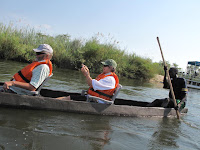We enter the Caprivi Strip where we spend the night at the beautiful Nunda Lodge. We were housed in tents on platforms, overlooking the Okavango River. Right outside our door, in the river, and sometimes closer, are hippo. Security guards walk about throughout the night to prevent hippo from coming too close to our tents.
 |
| Our lodge from the water |
The 1430 km Okavango River rises in central Angola, then flows southeast across Namibia's Caprivi Strip before entering Botswana east of Shakawe. There, 18.5 billion cubic metres of water annually spread and sprawl like an open palm across the flat landscape as they are consumed by the thirsty air and swallowed by the Kalahari sands. Eventually, the river loses itself in a 16,000 square km maze of lagoons, channels and islands. In this desert country, the incongruous waters of the resulting wetland, best known as the Okavango Delta, attract myriad birds and other wildlife. (LP)
 |
| Lush gardens around the lodge |
 |
| Our tent |
 |
| Our inside/outside bathroom |
 |
I borrowed this great photo from Dora.
See the lightening in the background? |
 |
| Pretty and very refreshing pool |
 |
This harmless cutie showed up in the tree beside
the pool |
 |
We took a pontoon boat out on the river
then transferred into the Mokoro's tied to the
back to travel further up-river |
 |
| Fishermen beside the river |
 |
Hey guys, haven't you heard there are crocs
and hippo in this river? |
 |
| Carol |
 |
| Dora |
 |
| Sam, Russell and our guides |
 |
Off the boat. Time to board the much
more tipsy Mokoro |
 |
| Stephan |
 |
| Mokoro |
 |
| Don't move! |
 |
This was the really tippy one...
apparently a new guide and Sam kept wriggling |
 |
| Pretty lodges along the way |
 |
Stopping at a set of rapids, we learned
how our guides cool off on a hot
summers day |
 |
| Swim into the current |
 |
| Mind the rocks....or are they rocks?? |
 |
| Then enjoy the ride! |
 |
That evening, we are entertained dancing and
song, by a group of local school children |
 |
| Dining Room staff |
 |
| The hippos in our back yard |
Stephan, Anja, Carol and I decided to hire one of the Mokoro guides to take us to his village. We walked across dusty fields in very hot weather, to reach the village. 40% of the money from the tour, goes to support his village. He is a young man of 24 years with 3 children, aged 6 months to 7 years. The village is very poor and at times, they haven't a clue where they will find their next meal. He explained that the way it works in the village is that someone always has something to offer up for the potluck meal, usually only one a day. A hen is not coveted by the family who may have one to spare, but is shared with everyone in the village. A missionary couple we met at the lodge said that Africans do get a balanced diet but it takes a year to get it. Everything is seasonal, just like here however they don't have refrigerators, and other modern conveniences, to store their food. No TV's, iPods, DS's or computers either!!!
Stephan asked our guide if he had a cell phone and he replied that he had had one which was provided by the lodge, however a young couple who hired him and his Mokoro the week before our arrival, had upset the canoe and he had lost it. Stephan works internationally in the cell phone technology business and muttered that he could have brought a dozen cell phones with him, had he known that guides in remote areas used them but had to pay for them if they are broken or lost.
 |
Building a hut. That is a tent inside the
structure |
 |
| Eggs and future meals |
 |
| Our guide with some of the village children |
 |
| Grains..... |
 |
| ....and beans |
 |
| ..that make a meal |
 |
Carol grinding maize, to the amusement
of the villagers |
 |
| Broken flip-flops, torn clothing |
 |
| ..and yet, happy.... |
 |
| ..for now |
 |
| Stephan, brave enough to try moonshine |
 |
A question you never hear in the village shops:
"Madam, would you like to purchase a bag to carry that?" |
 |
Walking through the fields, back to the lodge, the guide
stopped abruptly to allow this little fella to pass. We
didn't ask and he didn't tell if it could kill us. |
 |
| Example of more upscale village structures |
The dusty roads were busy with all ages, walking many, many km's to set about their daily tasks. Children walk up to 20 km to attend school.
We were close to and could see the Angolan border. We met a missionary couple at the lodge who were forced out of the mission, close to the border, because rebels bombed and set land-mines around the mission. They attempted a return to their home and were pushed back again and so they left and set up a mission in Mozambique. When Bob asked them who funded the government side of the Angolan war, they said "the U.S." and when I asked who funded the weapons for the rebels, they smiled sardonically and said "the CIA".











































No comments:
Post a Comment